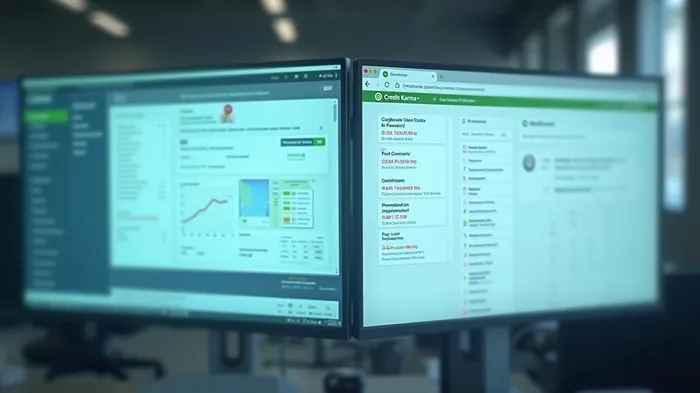Why Intuit's AI-Driven Transformation is Powering Stock Gains Ahead
The financial technology landscape is undergoing a seismic shift, and IntuitINTU-- (NASDAQ: INTU) is at the epicenter of it. After delivering Q1 2025 earnings that underscored its AI-driven growth strategy, the company is now poised to capitalize on a $100+ billion market opportunity in automated financial solutions. Here's why investors should act now—before the market fully recognizes the power of Intuit's AI integration.
Q1 2025 Earnings: A Baseline of Strength, Masked by Short-Term Concerns
Intuit's Q1 2025 results, released in November 2024, were a mixed bag on the surface. While revenue rose 10% to $3.3 billion, GAAP net income dipped due to a $42 million loss on a private equity stake. The stock initially fell 6% in after-hours trading, with investors fixating on delayed revenue guidance. But beneath the noise lies a compelling narrative: AI is rewriting the rules of financial software.

Key highlights from Q1:
- Credit Karma revenue soared 29%, fueled by AI-driven loan and insurance products.
- QuickBooks Online Accounting rose 21%, thanks to AI-enhanced automation of invoicing, tax compliance, and financial reporting.
- Mailchimp's growth hit 19%, powered by AI-powered marketing analytics and customer segmentation tools.
The declines in legacy desktop software (down 17%) were a temporary hurdle, not a threat. Intuit's pivot to subscription-based, AI-augmented cloud services is the real story—and it's just beginning.
The AI Advantage: How Intuit is Future-Proofing Its Revenue Streams
Intuit's CEO, Sasan Goodarzi, has staked the company's future on its “done-for-you” AI platform strategy, which blends machine learning with human expertise. This approach isn't just a buzzword—it's already driving tangible results.
TurboTax Live + AI:
TurboTax's AI-powered expert connections reduced customer effort by 40%, boosting retention even as tax season revenue dipped due to a California tax deadline expiration.QuickBooks AI Tools:
Features like automated expense tracking and cash flow forecasting are increasing customer lifetime value. For small businesses, these tools cut financial management time by 50%, making QuickBooks indispensable.Credit Karma's AI Engine:
The platform's loan and credit card recommendations now boast 90% accuracy thanks to AI, driving higher adoption rates and fee-based revenue.
The proof? In Q2 2025, Intuit's revenue surged 17% to $4.0 billion, with AI-dependent segments like Global Business Solutions (GBS) and Credit Karma leading the charge. GBS revenue jumped 19%, while Credit Karma's growth hit 36%, proving AI's scalability.
Market Catalysts: Why Now is the Time to Buy
Accelerating Guidance:
Intuit raised its fiscal 2025 EPS guidance to $19.16–19.36, up from prior estimates. Management now projects 12–13% revenue growth, with AI segments like GBS and Credit Karma expected to grow 16–21%.Margin Expansion:
Non-GAAP operating margins hit 37% in Q2, up from 34% a year ago. AI's efficiency is reducing costs while raising prices—QuickBooks' average revenue per user rose 8% in Q2.Balance Sheet Strength:
With $2.5 billion in cash and $3.6 billion remaining in its buyback program, Intuit is primed to reward shareholders. The recent 16% dividend hike to $1.04/share signals confidence in its AI-fueled cash flow.
Risks? Consider the Bigger Picture
Naysayers will point to macroeconomic headwinds or regulatory risks (e.g., tax software competition). But Intuit's AI moat is widening:
- Switching Costs: Businesses and consumers pay a premium for AI-driven automation, making competitors' legacy systems obsolete.
- Network Effects: Credit Karma's 100 million users and QuickBooks' 6 million subscribers create data feedback loops that refine AI models further.
Even in a slowing economy, small businesses and individuals will prioritize cost-saving tools—exactly what Intuit's AI platforms provide.
The Bottom Line: Buy Now, or Miss the Takeoff
Intuit is no longer a tax software company—it's a financial AI powerhouse. With AI-driven revenue streams now accounting for 75% of total growth, the stock is undervalued at 20x forward earnings.
Action Items for Investors:
- Buy INTU: Target $600+ in 12 months (vs. $550+ current price).
- Hold for the Long Term: AI's 5–10 year adoption curve ensures compounding growth.
- Set Alerts: Watch for Q3 earnings (May 2025) to validate AI's role in stabilizing desktop software sales.
The writing is on the wall: AI is the new engine of Intuit's empire. Those who act now will reap the rewards as the market catches up.
Investment decisions should consider individual risk tolerance. Consult a financial advisor before making portfolio changes.
Tracking the pulse of global finance, one headline at a time.
Latest Articles
Stay ahead of the market.
Get curated U.S. market news, insights and key dates delivered to your inbox.

Comments
No comments yet